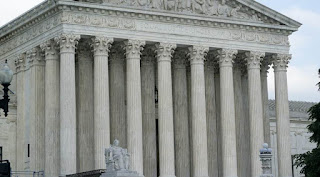Supreme Court May Hear Case With Serious Ramifications for the Transgender Debate
The Supreme Court might just be considering a case that could have a substantial impact on the transgender debate. As the nation grapples with how society should handle the transgender issue, this one will almost certainly ignite even more debate and controversy.
On Monday, Alliance Defending Freedom (ADF) attorneys submitted a petition to the US Supreme Court, requesting that the case of Brian Tingley, a licensed marriage and family counselor, be heard. Tingley claims that a Washington state law is unconstitutionally censoring him.
According to ADF, the Washington state’s law regarding “conversion therapy” of minors infringes on Tingley’s freedom of speech and religious faith, as well as those of his clients, by censoring and prohibiting private client-counselor conversations on sexual orientation and gender identity that the government disapproves of. ADF is urging the Supreme Court to overturn a ruling by the US Court of Appeals for the 9th Circuit, which upheld a district court’s decision to dismiss Tingley’s challenge to the law.
“The government can’t control a counselor’s speech. Washington’s counseling censorship law violates freedom of speech and harms counselors as well as clients,” said ADF Senior Counsel and Vice President of Appellate Advocacy John Bursch. “Brian has counseled all types of people for more than 20 years, and those conversations are private—certainly not open for the government to censor. The government has no business dictating what personal goals a client can pursue in counseling. We hope the Supreme Court will agree to hear this case and halt the unlawful attempt of Washington state officials to ban someone’s speech simply because they disagree with the viewpoints expressed.”
In 2018, the state of Washington enacted a law that prohibits conversations between a counselor and a minor client aimed at “changing” the young person’s perceived gender identity or sexual attractions. The lawsuit notes that the law censors simple conversations within a voluntary counseling relationship between a client and a counselor that are directed toward personal goals that the client chooses for themselves.
As noted by the ADF, the law only allows counselors to counsel in an affirming direction when it comes to LGBTQ minors. “It allows counseling conversations that aim to steer young people towards a transgender identity but prohibits conversations that aim to help the same person return to comfort with their sex.” This is especially problematic given that the vast majority of children who suffer from gender dysphoria end up growing out of it. Further, the ADF points out, “The law threatens fines of $5,000 per violation, suspension from practice, and even permanent revocation of a counselor’s license.”
This is in line with efforts on the part of the Biden administration to stop therapy designed to offer different solutions for children suffering from gender dysphoria.
The State Department, under Secretary Antony Blinken, issued a memo last year as part of its efforts to implement President Joe Biden’s Executive Order 14075, which calls for an end to “conversion therapy” by federal agencies. The practice of conversion therapy, which aims to change a person’s sexual orientation or gender identity, has been widely criticized for its harmful effects on homosexual and bisexual individuals.
However, some have raised concerns about the administration’s definition of conversion therapy, particularly when it comes to children with gender dysphoria. The definition includes any attempt to “suppress or change an individual’s … gender identity,” which some argue could encompass even talk therapy aimed at helping children move away from gender dysphoria.
Critics see this as part of a larger push by progressives to promote “gender-affirming” treatments like puberty blockers and surgical procedures for children instead of talk therapy. The White House’s inclusion of extreme methods like “electric shock” and “corrective rape” in the definition of conversion therapy has also been criticized as a way to conceal its true intentions.
The petition that ADF attorneys submitted to the Supreme Court in Tingley v. Ferguson states:
In the Ninth Circuit, counseling speech is not speech at all; it is professional conduct the government can freely regulate. But that view is indefensible after this Court [held in the ADF case NIFLA v. Becerra] that “[s]peech is not unprotected merely because it is uttered by ‘professionals….'” It also places the Ninth Circuit in conflict with the Third and Eleventh Circuits, both of which have held that speech in a counseling context is still speech entitled to First Amendment protection…. The Court should not allow the circuit split to stand.
This is not the first such case being adjudicated regarding a state law. Fox News reported:
A similar case out of New York was successfully litigated by the group in 2019 on behalf of Dr. Dovid Schwartz, an Orthodox Jewish psychotherapist who sued New York City claiming that a similar law prohibited certain patient-counselor conversations, which he said violated his free speech rights.
If the Supreme Court chooses to hear this case, it would likely send shockwaves through the national conversation on transgenderism, especially among minor children. The First Amendment issue will certainly be the focus, as will a parent’s right to seek treatment for their children that they deem appropriate. In 20 states, these laws essentially dictate how a person can seek medical or psychological care.
What is even more rich about this whole situation is that most of those who support the government preventing therapists from counseling a child against transgenderism fully support the notion that medical professionals should prescribe medications and surgeries that have an irreversible impact on the young one. You can’t tell a kid not to transition to the opposite gender, but you can certainly cut off body parts or put them on dangerous drugs. Hopefully, the Supreme Court will take up this case and rule in favor of the plaintiff.





Post a Comment